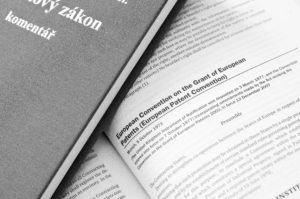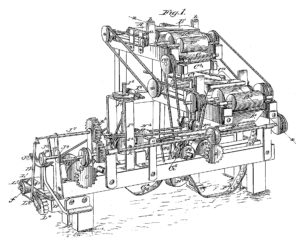Opposition, limitation or revocation procedure
 At the request of the proprietor, the European patent may be revoked or be limited by an amendment of the claims. The request shall be filed with the European Patent Office in accordance with the Implementing Regulations. It shall not be deemed to have been filed until the limitation or revocation fee has been paid.
At the request of the proprietor, the European patent may be revoked or be limited by an amendment of the claims. The request shall be filed with the European Patent Office in accordance with the Implementing Regulations. It shall not be deemed to have been filed until the limitation or revocation fee has been paid.
The request may not be filed while opposition proceedings in respect of the European patent are pending.
The European Patent Office shall examine whether the requirements laid down in the Implementing Regulations for limiting or revoking the European patent have been met. If the European Patent Office considers that the request for limitation or revocation of the European patent meets these requirements, it shall decide to limit or revoke the European patent in accordance with the Implementing Regulations. Otherwise, it shall reject the request. The decision to limit or revoke the European patent shall apply to the European patent in all the Contracting States in respect of which it has been granted. It shall take effect on the date on which the mention of the decision is published in the European Patent Bulletin.
If the European patent is limited, the European Patent Office shall publish the amended specification of the European patent as soon as possible after the mention of the limitation has been published in the European Patent Bulletin.
Within nine months of the publication of the mention of the grant of the European patent in the European Patent Bulletin, any person may give notice to the European Patent Office of opposition to that patent, in accordance with the Implementing Regulations. Notice of opposition shall not be deemed to have been filed until the opposition fee has been paid. The opposition shall apply to the European patent in all the Contracting States in which that patent has effect. Opponents shall be parties to the opposition proceedings as well as the proprietor of the patent. Where a person provides evidence that in a Contracting State, following a final decision, he has been entered in the patent register of such State instead of the previous proprietor, such person shall, at his request, replace the previous proprietor in respect of such State.
Opposition may only be filed on the grounds that:
(a) the subject-matter of the European patent is not patentable;
(b) the European patent does not disclose the invention in a manner sufficiently clear and complete for it to be carried out by a person skilled in the art.
If the opposition is admissible, the Opposition Division shall examine, in accordance with the Implementing Regulations, whether at least one ground for opposition prejudices the maintenance of the European patent. During this examination, the Opposition Division shall invite the parties, as often as necessary, to file observations on communications from another party or issued by itself.
If the Opposition Division is of the opinion that at least one ground for opposition prejudices the maintenance of the European patent, it shall revoke the patent. Otherwise, it shall reject the opposition.
If the Opposition Division is of the opinion that, taking into consideration the amendments made by the proprietor of the European patent during the opposition proceedings, the patent and the invention to which it relates
(a) meet the requirements of this Convention, it shall decide to maintain the patent as amended, provided that the conditions laid down in the Implementing Regulations are fulfilled;
(b) do not meet the requirements of this Convention, it shall revoke the patent.
If the European patent is maintained as amended, the European Patent Office shall publish a new specification of the European patent as soon as possible after the mention of the opposition decision has been published in the European Patent Bulletin.
Each party to the opposition proceedings shall bear the costs it has incurred, unless the Opposition Division, for reasons of equity, orders, in accordance with the Implementing Regulations, a different apportionment of costs.
The procedure for fixing costs shall be laid down in the Implementing Regulations. Any final decision of the European Patent Office fixing the amount of costs shall be dealt with, for the purpose of enforcement in the Contracting States, in the same way as a final decision given by a civil court of the State in which enforcement is to take place. Verification of such decision shall be limited to its authenticity.
Any third party may, in accordance with the Implementing Regulations, intervene in opposition proceedings after the opposition period has expired, if the third party proves that
(a) proceedings for infringement of the same patent have been instituted against him, or
(b) following a request of the proprietor of the patent to cease alleged infringement, the third party has instituted proceedings for a ruling that he is not infringing the patent.
An admissible intervention shall be treated as an opposition.

